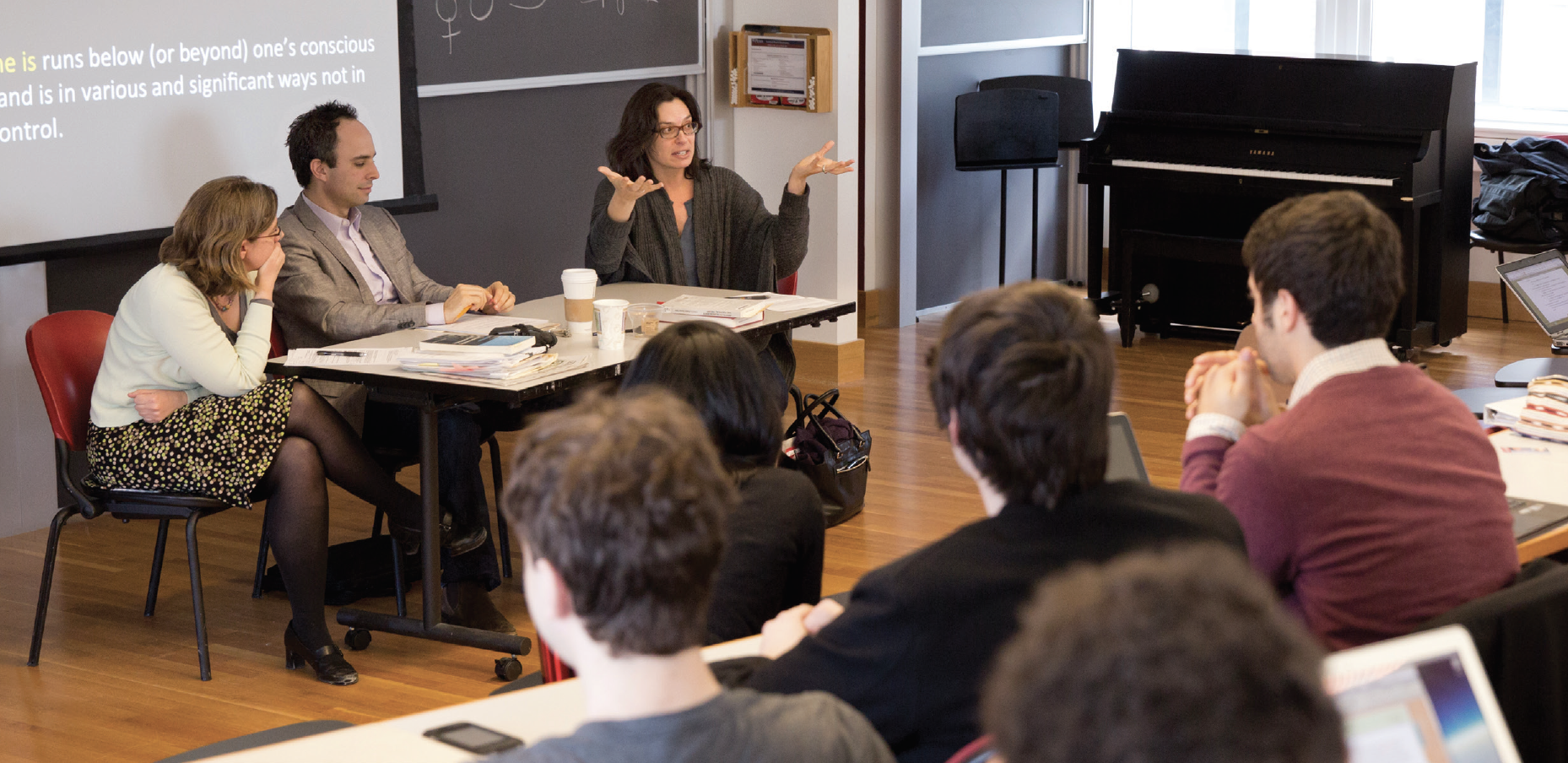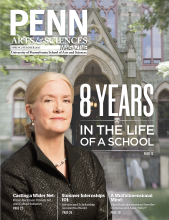It’s not often you’re asked to think about thinking, but that’s exactly what 80 College freshmen did this spring, in an ambitious and demanding crash course in the full scope and power of the liberal arts.
Just finishing its second year, SAS’s Integrated Studies Program (ISP) was designed specifically for College freshmen accepted as Benjamin Franklin Scholars, a designation that requires an additional application process. “This was a way for us to dive into the core of what the liberal arts mission is, for students who really came here to pursue ideas for their own sake,” says Peter Struck, an associate professor of classical studies and the founder and director of ISP.
The program, which provides half of its students’ credits for the year, involves a professor each from the humanities, social sciences, and physical sciences, teaching an introductory class in his or her field, all organized around a common theme. The fall semester’s theme was “Knowing,” the spring’s was “Thinking;” both reflecting the University’s “Year of Proof.”
In both semesters, each professor taught one day between Monday and Wednesday; then all three, along with ISP’s three post-doctoral teaching fellows, met with the students on Thursday. On Friday the fellows worked with sections of 14 students each. There is also an extracurricular program each Wednesday evening in Riepe House, where the students all live.
Spring semester, the faculty were Associate Professor of Philosophy and Education Karen Detlefsen; Janice and Julian Bers Assistant Professor in the Social Sciences Jeffrey Green, a political scientist; and Christopher H. Browne Distinguished Professor of Psychology Sharon Thompson-Schill, a cognitive scientist. They began meeting to design their course more than a year earlier. “I learned more teaching this course than from any other course I’ve ever taught,” says Thompson-Schill. “Even trying to figure out the language—when I used a word and Jeff used a word, they might not mean the same thing. It was a huge learning curve.”
They produced a grid outlining a theme and what each professor would teach each week. For “Moral Dilemmas,” for example, Green spoke about the “Dirty Hands” tradition, when a politician considers an immoral action to achieve a greater good. Thompson-Schill discussed experiments studying moral development in babies, while Detlefsen covered writings on whether there is a conflict between educating people for individual development versus citizenship.
It was even more demanding for the students, though by definition the Franklin Scholars are ready for a challenge. “They were very energetic and engaging with all the teachers in the classroom,” says Green. “They’re some of the most ambitious and driven and talented students, but they are freshmen.”
“It was difficult—a lot of work,” says student Harry Cooperman. “But it’s a new approach, and it was something I wanted to experience, to try to learn three different, extremely separate topics and ask, how does each one approach the same idea?”
From the beginning, ISP was designed as a residential program, with the students not only learning but living together. “There’s an ISP humor,” Melissa Beswick says. “We were all reading the same things, talking about the same concepts, so people made really nerdy, really intellectual jokes that nobody outside ISP would understand.”
Struck sees the program as a hothouse, to help the students discover their intellectual passion and prepare them for a world in which being able to see questions from a variety of angles will be invaluable. “We don’t aim for some tidy bow at the end of the week, to say, okay, now we understand what X truly is,” he says. “Just finding the boundaries and dimensions of each discipline’s contribution is hugely instructive. The multiple disciplines give you another place to stand from which you can analyze what’s happening in your own world. There’s nothing like it.”
“The students did an extraordinary job of writing philosophically with a richness that I don’t normally see, precisely because they were drawing on productive ways of thinking from the other two streams.”
Detlefsen adds, “Some of the students did an extraordinary job of writing philosophically with a richness that I don’t normally see, precisely because they were drawing on productive ways of thinking from the other two streams.”
Beswick realized that the program is making a difference in how she approached her other courses, and she brought perspectives from them to her ISP classes, as well. “It was impossible to write the essays without taking ideas from so many different places and putting them together in new and exciting ways,” she says. “I could have worked on some of them for days or for weeks. Months.”
“I feel it is something that has changed the course of my studies at Penn,” says Cooperman. He had been pondering a double major but now feels that one major and other diverse courses will be a stronger background. “I think that’s what ISP opened my mind to—trying different things. ISP was like dipping your feet into the water, a pool that you don’t know the depth of. It was like a leap of faith. And it was worth it.”





